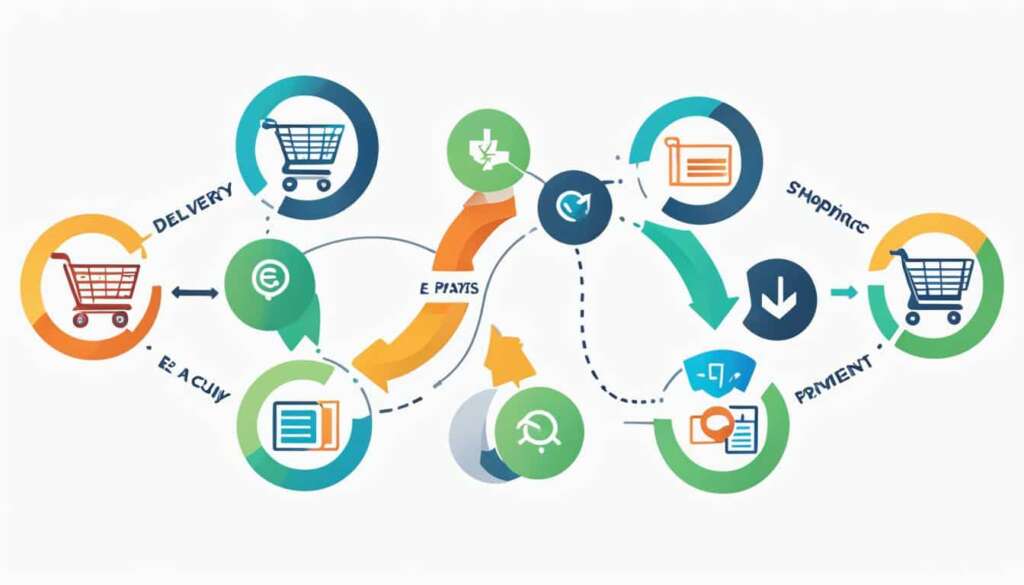Table of Contents
E-commerce, or the act of buying and selling products and services online, has revolutionized the way businesses operate. It offers a multitude of advantages that can significantly impact the success and growth of both small and large enterprises. In this article, we will delve into the benefits and opportunities that e-commerce brings, as well as address some of the challenges and considerations that come with this digital realm.
With the rapid advancement of technology, e-commerce has become an essential part of the future of commerce. As more and more people turn to online platforms for their shopping needs, businesses that sell online have the potential to reach an unprecedented number of customers. The ability to expand customer base beyond geographical limitations is one of the key advantages of e-commerce, allowing businesses to tap into a global market and increase their revenue streams.
Another significant benefit of e-commerce is its accessibility and convenience. Unlike traditional brick-and-mortar stores, online shops are always open, 24/7, providing consumers with the freedom to browse and make purchases at their convenience. This flexibility aligns perfectly with the modern on-demand lifestyle, where convenience is highly valued.
A major advantage for both sellers and buyers is the lower cost associated with e-commerce. Operating an online store requires fewer expenses compared to maintaining a physical retail space. Sellers can save on costs related to rent, utilities, and staffing. This translates to potential cost savings for consumers as well, as online shopping eliminates the need for travel expenses and offers competitive pricing through price comparison.
While e-commerce offers numerous benefits, it is important to address customer concerns. Privacy and security are key considerations when it comes to sharing personal information online. Online businesses must prioritize safeguarding customer data and providing secure payment methods to build trust and alleviate these concerns. Additionally, the lack of in-store engagement and personalized experience in online shopping can be a drawback, particularly in industries where tactile considerations and individualized attention are essential.
Despite these challenges, e-commerce continues to shape the future of commerce. It provides businesses with a gateway to a global market, offering diverse product selections and fostering price competition. With its convenience, personalization options, easy comparison, and low-cost operations, online shopping has become increasingly popular among consumers. As businesses adapt and embrace e-commerce, they can unlock its full potential, ensuring their place in a digitally-driven marketplace.
Reaching More Customers
One of the major advantages of e-commerce is the potential to reach more customers and expand your customer base. Unlike brick-and-mortar stores, online retail allows businesses to overcome geographical limitations and target customers worldwide. This means that businesses no longer have to rely solely on the local market and can tap into a global audience.
Many businesses have reported a significant increase in customers and revenue after launching an online retail presence. With effective online promotion and marketing strategies, businesses can increase their revenue and expand their customer base. The internet has made it possible for any interested individual from anywhere in the world to become a customer, as long as the business is willing to ship to their location.
Online retail opens up a world of possibilities for businesses to reach a wider audience and generate more sales. By establishing an online retail presence, businesses can unlock new markets and tap into the vast potential of e-commerce.
Expanding Your Customer Base
Expanding your customer base is essential for the growth and success of any business. E-commerce offers a powerful platform to do just that. With the ability to reach customers globally, businesses can expand their customer base far beyond what is possible with a physical store.
Reaching more customers through e-commerce also provides an opportunity for businesses to increase their revenue. The wider the customer base, the greater the potential for sales and profit.
| Benefits of Reaching More Customers | Impact on Business |
|---|---|
| Increased brand exposure | Higher brand recognition and visibility |
| Diversification of customer base | Reduced dependency on local market fluctuations |
| Opportunity for international expansion | Access to new markets and revenue streams |
| Greater customer loyalty | Repeat purchases and long-term business growth |
Expanding your customer base through e-commerce not only increases the potential for sales and revenue but also provides a solid foundation for long-term growth. By reaching more customers, businesses can establish a strong online retail presence and expand their reach in the global marketplace.
Always Open for Business
E-commerce provides the advantage of always being open, allowing customers to browse and make purchases at any time, day or night. With 24/7 availability, online stores cater to the needs of customers who may have busy schedules or different time zones. This flexibility eliminates the constraints of fixed operating hours, providing a convenient shopping experience for buyers.
Customers can access online stores and shop from the comfort of their own homes or anywhere with internet access. There is no need to commute to physical stores, face parking challenges, or jostle through crowds. Instead, individuals can relax and shop at their own pace, making informed purchasing decisions without any time pressure.
In addition to the convenience for customers, e-commerce is cost-effective for sellers. Online stores eliminate the need for sellers to maintain physical storefronts or hire staff for round-the-clock operations. By leveraging the power of technology and automation, businesses can keep their virtual doors open without incurring additional expenses related to traditional brick-and-mortar establishments. This translates into significant cost savings, allowing sellers to allocate resources strategically towards other aspects of their operations, such as marketing, inventory management, or customer service.
Convenient shopping and cost-effective operations contribute to the success of e-commerce, benefiting both customers and sellers. The always-open nature of online stores ensures that shoppers have the flexibility to make purchases whenever it suits them, while sellers can maximize their business potential by tapping into a global marketplace that operates 24/7.

Lower Cost and Increased Convenience
E-commerce offers significant cost savings for both sellers and buyers. Operating an online store requires lower expenses compared to maintaining a physical store, as there is no need for staff to run registers and manage the store. This reduction in overhead costs allows businesses to allocate their resources more efficiently and invest in other areas of growth. Additionally, e-commerce eliminates the need for property rentals, utilities, and other expenses associated with brick-and-mortar establishments.
Shoppers also benefit from reduced costs when they engage in online shopping. With e-commerce, there are no travel expenses or parking fees incurred when visiting a physical store. Customers can simply access their favorite online stores from the comfort of their own homes, saving valuable time and money. This accessibility aligns perfectly with the on-demand lifestyle that many people lead, providing the convenience of shopping at any time and from anywhere.
Customer Concerns and In-Store Engagement
Despite the benefits of e-commerce, customer concerns about privacy and security when providing personal information online can arise. Online stores need to prioritize the implementation of secure systems and safeguards to address these concerns effectively. Building trust with customers is crucial for the success of an online business.
Furthermore, e-commerce lacks the in-store engagement and personalized experience that brick-and-mortar stores provide. The tactile experience of trying on clothes and engaging with sales assistants, particularly in industries like apparel, is something that customers may still prefer. Online shopping may not always provide enough information for shoppers, such as tactile considerations (like the feel of fabric) and fit descriptions, which can significantly influence purchasing decisions.
Personalization and the Human Touch
Brick-and-mortar stores have an advantage in creating a personalized experience for customers through face-to-face interactions. Sales assistants can offer expert advice and assistance, creating a unique and tailored shopping experience. Conversely, online stores may rely on algorithms and data analysis to provide personalized product recommendations, but it’s not the same as the human touch provided in physical retail.
“The tactile experience of trying on clothes and engaging with sales assistants is something online shopping cannot replicate.”
Evolving Privacy and Security Measures
Addressing customer concerns about privacy and security in e-commerce is essential for building trust. Online businesses must invest in robust security systems, utilize secure payment gateways, and prioritize data protection. Transparent communication about privacy policies and data handling practices can also help alleviate customer concerns.
To further address privacy and security concerns, industry standards and regulations, such as the General Data Protection Regulation (GDPR), play a crucial role in safeguarding customer information. Compliance with these standards demonstrates a commitment to protecting customer privacy and can help build trust with shoppers.

Creating a balance between personalized online experiences and addressing customer concerns regarding privacy, security, and the human touch remains a challenge for e-commerce businesses. While advancements in technology and AI continue to enhance online shopping experiences, finding innovative ways to engage customers and address their concerns will be key to staying competitive in the digital marketplace.
Conclusion
In conclusion, e-commerce offers numerous benefits for businesses and consumers alike. It provides opportunities to reach a larger customer base, be open 24/7, and operate at lower costs. While there are customer concerns about privacy and security, and the lack of in-store engagement, the convenience and global reach of e-commerce outweigh these disadvantages.
As the world becomes increasingly connected and technology-driven, the future of commerce lies in e-commerce. Businesses that embrace e-commerce can tap into the global market, offer diverse products, compete on price, and provide convenience and personalization to customers.
By understanding the benefits and challenges of e-commerce, businesses can prepare themselves for the future and unlock the full potential of online retail.
FAQ
What is e-commerce?
E-commerce refers to the business of buying and selling products and services online.
What are the advantages of e-commerce?
E-commerce offers several advantages, including the ability to reach a larger customer base, be open 24/7, and lower costs for both sellers and buyers.
What are the disadvantages of e-commerce?
Some disadvantages of e-commerce include customer concerns about privacy and security, the lack of in-store engagement, and the added cost of operating an online store.
What is the future of commerce?
As the world becomes increasingly connected and technology-driven, the future of commerce lies in e-commerce.
How can businesses reach more customers using e-commerce?
By launching an e-commerce presence, businesses can overcome geographical limitations and target customers worldwide, potentially increasing customers and revenue.
How does e-commerce provide 24/7 availability?
E-commerce eliminates the need for fixed operating hours, allowing customers to make purchases at any time that is convenient for them.
What are the cost-saving benefits of e-commerce?
Operating an online store requires lower costs compared to maintaining a physical store, resulting in cost savings for both sellers and buyers.
How does e-commerce address customer concerns about privacy and security?
Online stores need to have secure systems and safeguards against fraud to address customer concerns about privacy and security.
What is the importance of in-store engagement in retail?
In-store engagement provides a personalized experience and allows customers to interact with products and sales assistants, which may not be available in online shopping.













